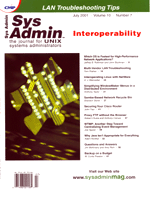The Servers We Use
We settled on custom-assembled PCs, using components that we find
to be very reliable, and which enjoy widespread driver support.
Our standard system consists of: ASUS P3B or CUV4X Pentium III motherboards,
384 MB RAM, Adaptec SCSI3 controller, IBM SCSI3 hard drives in a
dual-fan removable hard drive chassis, ATI AGP Rage Pro 3D display
card, Intel EtherExpress 10/100, all housed in an Antec 4U rackmount
case. Final cost: about $2000 per PC.
Operating Systems Used at Lyris for Networking Applications
Solaris 7, 8 for Intel for email list hosting:
- Low-cost PC hardware
- Reliable and high-performance multi-threading
- Very, very stable
- Reasonably good overall OS performance
Windows 2000 for SQL-based email list hosting:
- Fairly good stability
- Reliable and high performance multi-threading
- With VNC, fairly easy to remotely administer
- When using MS SQL server as a data store, reliability is much
improved over using NT file system (a client OS crash no longer
corrupts data, and live backups are possible, both of which are
not possible with the NTFS file system)
Red Hat Linux and Solaris 7, 8 Intel for application server:
- UNIX better than Windows for application servers due to stability,
easy application crash recovery, and scripting
- When an application is available on all UNIX variants, we tend
to use Solaris, due to stability. For example, very high DNS load
crashes the Linux (Red Hat 6.1 or 2.2.12-20) kernel, but DNS has
been very stable on Solaris.
- Some applications have a better feature set on Linux than on
other UNIX-style operating systems, so in those cases we use Red
Hat Linux.
Red Hat Linux for file servers:
- Strong Samba support (bi-directional, can mount Windows volumes)
- Software RAID is incredibly fast, easy to install (but not
very reliable)
- Considering FreeBSD w/Vinum (http://www.vinumvm.org/)
as a more stable, more full-featured software RAID alternative
(but installation is much more difficult than on Linux)
OpenBSD for firewall:
- Latest kernel version (2.8) is very stable, even with tens
of thousands of connections
- Built-in TCP/IP filtering at the kernel level is very fast
(much faster than on Linux)
- Security-conscious OpenBSD developers keep default feature
set at a minimum to keep security tight
- Routing and firewall can be handled in one system, helping
performance and management simplicity
|
